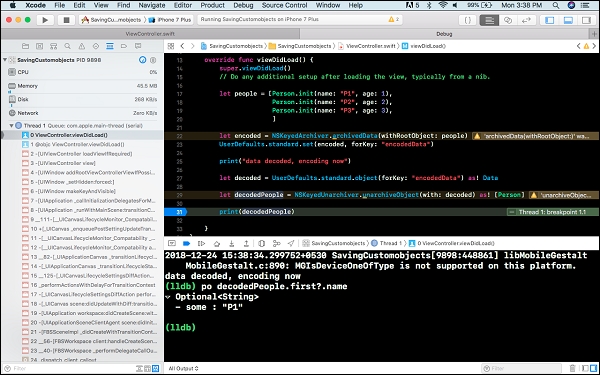
 Data Structure
Data Structure Networking
Networking RDBMS
RDBMS Operating System
Operating System Java
Java MS Excel
MS Excel iOS
iOS HTML
HTML CSS
CSS Android
Android Python
Python C Programming
C Programming C++
C++ C#
C# MongoDB
MongoDB MySQL
MySQL Javascript
Javascript PHP
PHP
- Selected Reading
- UPSC IAS Exams Notes
- Developer's Best Practices
- Questions and Answers
- Effective Resume Writing
- HR Interview Questions
- Computer Glossary
- Who is Who
How to store custom objects in NSUserDefaults?
In this article we’ll learn how to store custom objects in our application, but before you learn how to store custom object let’s see what are custom object?
A custom object is any class or structure or any other data that is not a native data type like Int, Double, String etc. Storing data in NSUserDefaults is a three step process.
Creating the custom Object
We’ll create a custom class Person that will have an age variable, and name variable.
class Person: NSObject, NSCoding {
var name: String
var age: Int
init(name: String, age: Int) {
self.name = name
self.age = age
}
required convenience init(coder aCoder: NSCoder) {
let name = aCoder.decodeObject(forKey: "name") as! String
let age = aCoder.decodeInteger(forKey: "age")
self.init(name: name, age: age)
}
func encode(with acoder: NSCoder) {
acoder.encode(age,forKey: "age")
acoder.encode(name,forKey: "name")
}
}
Encoding the custom object
In this step we’ll create an array of person object, call it people and initialize it with random data. Once we create that object we’ll use NSKeyedArchiver to archive this object and later store in userDefaults.
let people = [ Person.init(name: "P1", age: 1), Person.init(name: "P2", age: 2), Person.init(name: "P3", age: 3), ] let encoded = NSKeyedArchiver.archivedData(withRootObject: people) UserDefaults.standard.set(encoded, forKey: "encodedData")
Now we have successfully saved the archived object in core data, it’s time we unarchive and print that object.
Decoding the custom object
Similar to NSKeyedArchiver we have NSKeyedUnarchiver which we’ll use to unarchive this object.
let decoded = UserDefaults.standard.object(forKey: "encodedData") as! Data let decodedPeople = NSKeyedUnarchiver.unarchiveObject(with: decoded) as! [Person]
Now this “decodedPeople” object contains the object we created in the second step.
We can perform the desired operation with at object. Now let’s see how the ViewController file looks like;
import UIKit
class ViewController: UIViewController {
override func viewDidLoad() {
super.viewDidLoad()
// Do any additional setup after loading the view, typically from a nib.
let people = [
Person.init(name: "P1", age: 1),
Person.init(name: "P2", age: 2),
Person.init(name: "P3", age: 3),
]
let encoded = NSKeyedArchiver.archivedData(withRootObject: people)
UserDefaults.standard.set(encoded, forKey: "encodedData")
print("data decoded, encoding now")
let decoded = UserDefaults.standard.object(forKey: "encodedData") as! Data
let decodedPeople = NSKeyedUnarchiver.unarchiveObject(with: decoded) as! [Person]
print(decodedPeople)
}
}
Now put a break point on last print statement and run this code, when executed run this command
po decodedPeople.first?.name
which will result into
Optional<String> - some : "P1"
This is how it looks in the end.


